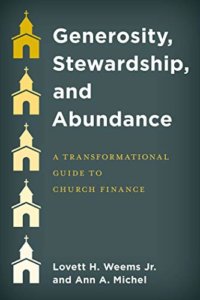Ann Michel of the Lewis Center staff says Thanksgiving is an opportunity to refocus our expressions of gratitude. True gratitude is always about the giver and not the gift. Faith invites us to focus less on what we are grateful for and more on the God to whom we owe thanks.
Growing up in a nominally religious household, Thanksgiving was the one night of the year when my family offered a blessing at the dinner table. I cringe when I think back on those prayers which so often used the language of piety to celebrate our relative good fortune. It’s never a bad thing to take stock of your blessings, of course. But I’ve become sensitive to the ways that our Thanksgiving rituals can foster a sense of gratitude that is more about pride and self-satisfaction than a humble acknowledgment of our dependence on God.
For Christians, the generosity of God is one of our most fundamental beliefs. God lovingly and graciously provides for our needs. God is the source of every good gift. But this belief can easily be distorted and even abused if we allow ourselves to see material excess as a sign of divine favor, if we mistakenly confuse God’s abundance with our proclivity toward overconsumption, and if we use the truth that everything we have is a gift from God to bolster the untruth that we somehow deserve what we have. These heresies are at the root of the American prosperity gospel. Too often, they lurk behind our expressions of gratitude as we gather for the annual Thanksgiving feast.
The truth is we don’t deserve anything. God’s gifts are unmerited and intended for all. God does not use generosity as a reward for a faithful few but rather to bring forth abundance for all. In a culture that extolls the virtue of self-sufficiency, it can be difficult to acknowledge our ultimate dependence on God’s provision. Having ample resources can leave us with the erroneous assumption that we can take care of our own needs, a hubris that blinds us to the ways God provides day by day.
Faith calls us to a more fulsome embodiment of gratitude — one that focuses less on what we are grateful for and more on the God to whom we owe gratitude. If gratitude is nothing more than celebrating what we have, it can spur us to want more. If gratitude points to God as giver, it reminds us of God’s generosity and inspires us be generous as God is generous. True gratitude always points to God not to ourselves. It is about the giver not the gift.
Churches often focus on gratitude and generosity in this season as part of their annual stewardship focus. This is a good thing — unless it’s nothing more than a fundraising ploy. Encouraging gratitude and generosity in support of God’s mission through the church is not an end unto itself. God’s purpose in calling us to lives of gratitude, generosity, and faithful stewardship isn’t merely to sustain the church. Rather, I’ve come to believe that the continued existence of the church is essential to sustain the powerful, transformative message of our faith regarding how we are to live in relation to money and material possessions.
Gratitude, generosity, and stewardship are more than a fundraising plan for the church. They are instruments God uses to counter greed and scarcity, to transform and reconcile communities, and to bring forth the abundant life that God intends for all God’s people. In an era of rampant consumerism and increasing income inequality, the world stands in need of the redeeming power of this gospel message. And keeping God the focus of our Thanksgiving is a good place to start.
 Ann Michel is coauthor with Lovett H. Weems Jr. of Generosity, Stewardship, and Abundance: A Transformative Guide to Church Finances (Rowman and Littlefield, 2021.)
Ann Michel is coauthor with Lovett H. Weems Jr. of Generosity, Stewardship, and Abundance: A Transformative Guide to Church Finances (Rowman and Littlefield, 2021.)
Related Resources
- 4 Ways to Help People Cultivate a Heart of Gratitude by Ann A. Michel
- Cultivate Generosity through Thankful Living by Sharron Blezard
- Living with Open Hands by Marty Cauley






